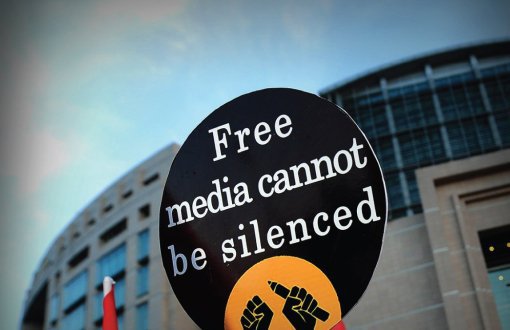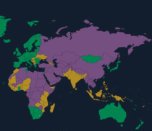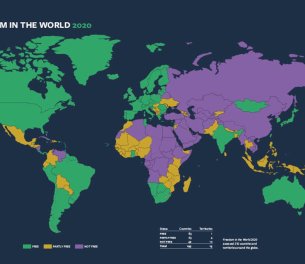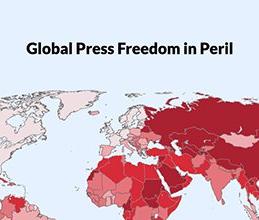Freedom House, a US-based watchdog organization for democracy, has released its 2022 edition of Freedom on the Net report, which identifies a 12th consecutive year of global decline in 'human rights online'.
"Internet freedom continued to decline in Turkey," according to the 2022 edition of the Freedom House report which says:
"During the coverage period, the 2020 Social Media Law was used to force platforms to remove content, primarily from independent and critical media outlets' websites. Thousands of online users, including members of the political opposition, faced criminal charges for their social media activities. Self-censorship, the proliferation of pro-government outlets, and blocking of independent media websites has created a less diverse online space in Turkey.
"Furthermore, pro-government troll networks orchestrated smear campaigns against outspoken activists, and prominent journalists faced physical violence in retribution for their online reporting."
The Freedom on the Net report evaluates internet freedom in detail under the three categories of obstacles to access, limits on content and violation of user rights.
Obstacles to Access
The score of Türkiye in relation to obstacles to access in connection with infrastructural limitations declined from 5/6 of last year to 4/6 this year.
This is because telecommunications infrastructure was damaged or stolen during the coverage period, causing internet disruptions across multiple provinces. The report says:
"Internet quality and speeds are reliable in Turkey. However, infrastructural damage impeded access to the internet during the coverage period."
High internet pricing, lowest affordability in Europe
Another reason why Türkiye cannot get a full score in this category is that internet pricing in Türkiye remains high.
"This is due to the market concentration in broadband services that have led to high costs, despite low wages and high inflation.
"Turkey has the lowest affordability score in Europe, ranking 46th globally" according to the report which also identifies other problems in relation to access:
"There is also a gender gap for internet access: 22 percent more men than women access the internet. However, there is no apparent gender gap in mobile phone access.
"During the COVID-19 pandemic, many students had no access to high-speed internet connections and were unable to participate in online classes.(...) 1.5 million students lacked internet connection."
Connectivity restricted for 16 hours during air strikes
Restrictions on connectivity are, on the other hand, relatively infrequent in Türkiye according to the report which identified the following:
"In February 2020, social media users reported connectivity issues that lasted 16 hours when Turkish troops conducted an air strike in northern Syria.
"In the past, internet disruptions targeted the restive southeastern region, where ethnic Kurds comprise a majority of the population. In September and October 2016, internet services were shut down in 10 cities for 6 hours—affecting some 12 million residents—coinciding with the removal of 28 Kurdish mayors from their posts.
Limited diversity of service providers
According to the report, Türkiye scores 3/6 in terms of regulatory and economic obstacles that restrict the diversity of service providers. Though all legal entities are allowed to operate an ISP, there are some requirements to apply for authorization."
A more significant cause for limited diversity of providers is the "failure of national regulatory bodies to operate in a free, fair and independent manner" according to the report, with Türkiye scoring 1 / 4 in this field.
Limits on Content
Türkiye scores very poor, 1/6, in relation to 'blocking online content. '
"Blocking of online content, particularly news and citizen journalism, has increased in recent years" according to the report.
The Free Expression Association found that more than 467,000 websites were blocked at the end of 2021. Blocked websites include those that publish content about Turkey's military operations, Kurdish news, and critiques of the government.
In March 2022, following Russia's invasion of Ukraine, Turkish internet users reported issues accessing Russian news portal Sputnik after the US and EU issued bans on the platform.
Forcing to delete content
Türkiye scores 0/4 in relation to 'forcing publishers, content hosts, or digital platforms to delete content,' according to the report which states:
"In addition to widespread blocking, state authorities are proactive in requesting the deletion or removal of content.
"Social media platforms comply with administrative decisions and court orders to avoid monetary fines, advertisement bans, access blocks, and bandwidth throttling.
"Popular Turkish websites are also subject to content removal orders. In 2020, 5,645 news articles received access blocking orders, and 4,620 were removed from servers by the news outlets.
"More than 7,500 Twitter accounts, 8,000 Facebook posts, and 12,000 YouTube videos were removed between 2015 and 2020.
"In March 2022, news website Cumhuriyet received a court order to block access to a story about the corruption of local government officials.
In July 2020, the "Right to be Forgotten" was recognized by Turkish authorities, allowing citizens to have content removed from search results. However, authorities have manipulated the law to remove negative press of prominent politicians from online databases.
Lack of Transparency
Türkiye again scores at the bottom with 1/4 regarding 'restrictions on the internet and digital content lacking transparency, proportionality to the stated aims, and an independent appeals process' according to the report:
"The July 2020 Social Media Regulations Law compels social media companies with over one million daily users to open in-country offices with a local representative. In December 2020, Facebook, Instagram, YouTube, Periscope, and Twitter were all fined 10 million Turkish lira ($1.2 million) after failing to appoint a representative.
"Following the fine, YouTube, Facebook, and Twitter opened local offices, though the companies claimed they would not alter their content moderation, transparency, and publication policies.
"In January 2021, TikTok also appointed a local representative, just one day before an advertisement ban for noncompliance would have been issued.
"Twitter and Pinterest were both issued advertisement bans in January 2021, though Twitter's ban was lifted after they opened their local office in March 2021.
"The majority of blocking orders are issued by the Information and Communication Technologies Authority (BTK), rather than by the courts. The procedures surrounding blocking decisions are opaque, creating significant challenges for those seeking to appeal. "The reasoning behind court decisions is not provided in blocking notices, and the relevant rulings are not easily accessible.
"Turkish authorities have an arsenal of tools to censor online content. The BTK can fine ISPs up to 300,000 liras ($38,309) for failing to comply with blocking orders within four hours of their issuance.
"Appeals to content restriction decisions are rarely effective"
Self-Censorship
Self-censorship of online journalists, commentators or ordinary users causes Türkiye to again score very badly, 1/4.
"The many prosecutions for defaming the president and the government's surveillance powers have had a chilling effect on social media users in recent years" according to the report.
" ... several NGOs that work on immigration and refugee rights have canceled or postponed online activities and have avoided issuing statements for fear of retribution from authorities.
"Members of the LGBT+ community and those who publish stories on LGBT+ issues often self-censor.
"Susma 24—which monitors and reports on censorship in the media, social media, and arts and culture—described in its 2020 report an increasing amount of self-censorship in society due to the Turkish government's violent treatment, arrests, detentions, and prosecutions of journalists; blocking of news articles; heavy financial penalties given to publishers; prosecution of social media users; and house-raids against journalists and private individuals."
Control and Manipulation by Government
Online sources of information are controlled or manipulated by the government or other powerful actors according to the 2022 edition of the Freedom on the Net report giving Türkiye a score of ¼. The report says:
"State-sponsored media and government manipulation of social media content has adversely impacted the online information landscape. Specifically, media coverage regarding the Kurdish-populated southeastern region is heavily controlled by the government.
"Numerous reports have revealed that the ruling AKP has enlisted an "army of trolls"—numbering around 6,000 individuals—to manipulate online discussions, drive particular agendas, and combat government critics on social media.
"Journalists, scholars, and opposition politicians who are critical of the government have faced orchestrated harassment on Twitter, often by dozens of users working to discredit them. For example, in May 2019, ahead of Istanbul's repeat mayoral election, numerous progovernment social media accounts spread a misleading and altered video of opposition candidate Ekrem İmamoğlu saying he would have terrorist groups run the country.
"Coordinated inauthentic behavior online is a problem in Turkey. In December 2021, Meta removed a network of inauthentic Facebook and Instagram accounts originating in Turkey and Libya. In June 2020, Twitter suspended state-linked accounts from Russia, China, and Turkey for violating the platform's policies. Some of those accounts originated in Turkey and shared pro-AKP and pro-Erdoğan content.
"During the coverage period, pro-government trolls purchased votes from a social media agency to skew results of an online poll regarding an infrastructural project in Istanbul."
Economic and Regulatory Constraints
Türkiye scores poorly again with 1/3 concerning 'economic or regulatory constraints negatively affecting users' ability to publish content online.'
"The government financially supports AKP-friendly online outlets through advertising and withholds such support from critical publications leaving independent online media at a disadvantage.
"Net neutrality is not explicitly protected by Turkish laws.".
Does online landscape lack diversity and reliability
Türkiye scores 2/4 according to the report which says:
"Shutdowns of independent outlets, the preponderance of pro-government media, and self-censorship have negatively affected the diversity of online content. The government's ownership and control of major media outlets has created challenges for independent journalism.
"Turkish internet users rely on online publications for reliable news, despite the country's restrictive legislation and blocking of many independent media outlets.
"While citizens can question and criticize Turkish politicians and leaders through blogs and social media, intimidation and prosecution of online users has led many to self-censor.
"Censorship of prominent local and foreign news sites, as well as government influence on reporters' coverage, make information-gathering even more difficult, particularly in the Kurdish-majority southeastern region.
"During the coverage period, authorities further restricted access to international news platforms. DW, Euronews, and VOA were given a 72-hour deadline in February 2022 to apply for a national license or face blocking. In July 2022, after the coverage period, DW and VOA were blocked for failing to obtain licenses.
"Social media platforms provide an important source of independent news, although the government has increasingly sought to censor social media content. The Reuters Institute for the Study of Journalism's Digital News Report 2022 found that people increasingly consume news via YouTube, WhatsApp, Instagram, and Facebook Messenger, as well as through Twitter.
Users' ability to mobilize, form communities and campaign
According to the report, Türkiye scored 3/6 on "users' ability to mobilize, form communities, and campaign, particularly on political and social issues." The report noted that:
"Digital activism has played a significant role in the country since the 2013 Occupy Gezi protests, although it has waned in recent years due to the repressive climate instilled after the 2016 coup attempt and the growing proclivity of people to self-censor.
"Internet users take to social media to advocate for justice and bring attention to criminal cases that may be ignored in the mainstream media.
"In the beginning of 2021, students, faculty, and alumni organizations held online and offline protests after a government-appointed trustee became the rector of Turkey's most prestigious educational institute, Boğaziçi University. Multiple online publications and networks emerged throughout the protests, some of which supported LGBT+ people at the university. Amid violent crackdowns on peaceful protesters, many students were arrested for supporting the protests on social media.
"In April 2021, before International Workers' Day, the GDS issued a directive banning citizen journalism and the recording of protests, likely in an attempt to prevent online criticism of the police's excessive use of force. The following month, during protests on International Workers' Day, police used the ban to justify unlawfully deleting content from professional journalists' devices. The State Council ruled that the directive banning audiovisual recordings during protests is a violation of the right to access information and press freedom, abolishing it as of November 2021.
Violations of User Rights
Legal protection
2022 Freedom on the Net report by Freedom House states that "constitution and laws of Turkey fail to protect free expression and press freedom online despite including broad protections for freedom of expression in theory." giving the country a score of ⅙ in this field.
Penalties for Online Activities
Türkiye scored ¼ in relation to "assigning criminal penalties or civil liability for online activities." The report says:
"Many provisions of the criminal code and other laws, such as the Anti-Terrorism Law, are used to criminalize online activity."
In late May 2022, the governing alliance submitted a "disinformation" bill to the parliament. The bill includes, among others, 40 clauses with specific provisions that would assign criminal penalties for online content.Specifically, anyone who publishes deliberate false information could receive a prison sentence of between one and three years.
"The new Family Physicians Contracting and Payment Regulation, which was introduced in June 2021, includes articles that prohibit health care professionals from making statements to the media, giving expert opinions, or posting to social media without authorization from superiors. The regulation includes punishments for those who do not comply."
Penalties Imposed
Apart from the regulatory framework, the Freedom House report gives a score to the countries for "individuals penalized for online activities, particularly those that are protected under international human rights standards", where it has given Türkiye a score of 0/6. The report says:
"The score declined from 1 to 0 because one person faces a life sentence for a social media post, and a journalist was given a life sentence in part due to a Facebook photo.
"Prosecutions and detentions of Turkish citizens for their online activities continued during the coverage period. Many journalists, activists, and ordinary citizens faced arrest in retaliation for criticism of the government, as well as expressions of Kurdish identity.
"Prosecutions for insulting the president online have increased in recent years. In November 2021, an internet user known as KM was charged with "attempted assassination of the President" after criticizing the president's handling of the COVID-19 pandemic on social media. A lawyer working on the case stated that there is no proof of an attempted assassination; nevertheless, KM faces a life sentence if convicted. There is no update on the status of the case as of June 2022.
"In September 2020, it was announced that 36,000 people were subjected to investigation for insults to President Erdoğan; of the 12,000 people who were put on trial, 3,831 were convicted, including 308 children. However, a March 2020 court ruling determined that insulting Erdoğan does not constitute insulting the president, as he has registered with a political party and thus lost impartiality. Despite this ruling, arrests and detentions for insulting Erdoğan on social media have continued, and the government has appealed the decision."
"Arrests are frequently used to intimidate critical journalists.
"Posting LGBT+ content online has also resulted in arrests. In October 2021, social media celebrity Pınar Yıldırım—also known as Pucca—was sentenced to 5 months and 18 days in prison for a tweet about homosexuality in films.
"During the coverage period, a number of online users were arrested for insulting religion.
"In August 2021, wildfires spread across Turkey, and many citizens criticized the government's response on social media. The Ministry of Interior announced that 3,246 people were investigated about their social media posts and 172 people faced criminal charges for their activities. Furthermore, the RTÜK issued 3.3 million liras ($222,000) in fines against news organizations that published information on the wildfires.
"During the coverage period, dozens of Syrian refugees living in Turkey were deported in retaliation for their online activities. During an October 2021 interview about the economy, a Turkish citizen made racist remarks about Syrian refugees, saying "we are unable to buy bananas but they [refugees] are eating every day." The comments sparked reactions from Syrians living in Turkey, who took to social media and posted photos and videos of them eating bananas. The Ministry of Interior's General Directorate of Immigration Management announced that at least seven Syrian refugees would be deported for their videos. An additional 31 Syrian refugees were investigated in Istanbul, and 11 were detained for posting videos of themselves eating bananas.
"In January 2021, a lawyer from the Istanbul Bar Association reported that thousands of Turkish citizens living abroad were subjected to detention, deportation, or refusal of entry when attempting to return to the country for making social media posts that authorities alleged contained terrorist propaganda, insults to the president, and incitement to violence."
Restrictions on Anonymous Communication
"Limitations on encryption and anonymity are concerns in Türkiye" says the Freedom Houser report and gives Türkiye a score of 2/4 in this field.
"According to the 2021 Inclusive Internet Index, only 40 percent of people trust that they can maintain their online privacy, and only 34 percent of people trust the security of government websites and applications.
"While there is no legal ban on VPN services in Turkey, users report widespread difficulties accessing the VPN services that they have purchased, either because of blocks that target VPN servers or because of deep packet inspections (DPI) that can detect and block VPN traffic.
State Surveillance on internet activities
"Government surveillance and the bulk retention of user data have violated privacy rights in Türkiye" according to the report and gives the country a score of ⅙.
"The constitution guarantees the right to privacy, though there are legal limitations on the use of encryption devices, and surveillance of online activity by security agencies is believed to be widespread.
"In June 2021, the Constitutional Court gave the Presidential Communications Directorate the power to request access to the private information of Turkish citizens held by "official institutions" and "public companies." Those opposed to the ruling warned that this would provide the government access to private data without any data protection or privacy safeguards."
Monitoring and Collection of User Data
Türkiye scored at the bottom again with 0/6 regarding infringement on users' right to privacy through monitoring and collection of user data by service providers and other technology companies according to the report:
"Law No. 6532 forces public and private bodies—including but not limited to banks, archives, private companies, and professional organizations, such as bar associations—to provide the MİT, Turkish Intelligence Agency, with any requested data, documents, or information regarding certain crimes related to national security, state secrets, and espionage. Failure to comply can be punished with imprisonment.
"Under Law No. 5651, hosting and access providers must retain all traffic information for one year and maintain the accuracy, integrity, and confidentiality of such data. In addition, access providers must file the data together with a time stamp and assist and support the BTK in monitoring internet traffic."
Intimidation or Physical Violence by Authorities
The report gave Türkiye a score of ⅖ in this field and listed many examples of intimidation and violence:
"Harassment of journalists on social media is a problem, and several people were physically attacked during the reporting period due to their online content. Online speech on Islam or the prophet Muhammad, the Kurdish civil conflict, criticism of excessive police force, and even mild criticism of the president, government, or ruling party can result in death threats and legal battles
"Intimidation of journalists through physical attacks limits the plurality of voices in the media.
"In March 2021, far-right networks led a hate-campaign targeting journalist Levent Gültekin on social media platforms. Gültekin was then assaulted by a mob of 25 people in front of the Halk TV station after making comments on one of the leaders of the 1967 coup and the founder of the far-right Nationalist Movement Party (MHP); the mob broke his fingers.
"Citizen journalists and reporters who participate in anonymous street interviews for online news outlets risk assault in retaliation for their statements.
"In February 2021, police physically intervened during a street interview for an online news platform when the interviewee criticized the government.
"Several social media users were targeted with death threats in retaliation for their online content during the coverage period.
"In November 2021, the press advisor to the leader of the MHP, a far-right ally of the government, sent a death threat to a popular comedian, Cem Yılmaz. The threats came after the comedian shared a message on social media announcing sympathy for imprisoned human rights defender Osman Kavala and former HDP co-chair Selahattin Demirtaş.
Members of the political opposition frequently experience online harassment. In November 2020, politician and criminal gang leader Alaattin Çakıcı threatened to kill the opposition CHP's leader Kemal Kılıçdaroğlu on Twitter after Kılıçdaroğlu criticized Devlet Bahçeli, the leader of the MHP. Twitter removed the threatening message for violating community standards; the Turkish authorities' investigation began weeks after the complaint was filed. However, a Facebook user who quoted Çakıcı's threat and challenged him online was subjected to a police special-ops raid and was arrested for insulting Çakıcı and inciting hatred and violence.
"Online gender-based violence is common. In May 2022, journalists Burcu Karakaş and Nevşin Mengü and lawyer İpek Maya Saygın were targeted in sexist attacks online. The same month, the far-right nationalist Victory Party shared hateful tweets about refugee women in Turkey.
"Government authorities have used online platforms to specifically target LGBT+ people. During the Boğaziçi University student-led resistance movement in early 2021—in which LGBT+ groups actively participated—the Minister of Interior referred to LGBT+ activists as "perverts" in a Twitter post, which the company later restricted as "hateful conduct."
Cyberattacks
The Freedom on the Net report saidTürkiye scored ⅓ in relation to cyberattacks;
"Cyberattacks have targeted news sites and journalists, particularly after publishing controversial information.
"Hackers frequently target online users and attempt to steal their financial information. According to Kaspersky Lab, 68 percent of internet users in Turkey have been targeted by phishing attempts.
"During the COVID-19 pandemic, hacking of social media accounts increased by 50 percent, while online phishing cases increased by 70 percent.
"Government websites and financial institutions were targeted by cyberattacks during the coverage period. In October 2021, Turkey's e-government portal was hacked, and user data was compromised."
The detailed report evaluates that Türkiye scores 14/25 in obstacles to access, 10/35 in limits on content and 8/40 in violations of user rights and 32/100 in total for freedom of internet, with further deterioration from last year's score of 34/100. (PE/VK)










